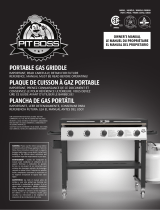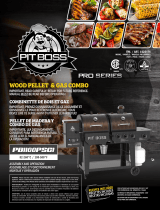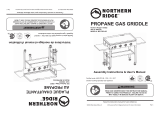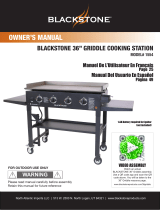
.. 3 ®
EN
ENGLISH
1. A minimum clearance of 1,270 mm (50 inches) from combustible constructions to the sides of the griddle, and 1,270 mm (50 inches) from
the back of the griddle to combustible constructions must be maintained. Do not install appliance on combustible floors, or floors
protected with combustible surfaces unless proper permits and permissions are obtained by authorities having jurisdiction.
Do not use this appliance indoors, in an enclosed or unventilated area, inside homes, vehicles, tents, garages. This appliance must not
be placed under overhead combustible ceiling or overhang. Keep your griddle in an area clear and free from combustible materials,
gasoline and other flammable vapors and liquids.
Should a grease fire occur, turn the griddle OFF until the fire is out. Do not throw water on. Do not try to smother the
fire. Use of an all-class (class ABC) approved fire extinguisher is valuable to keep on site. If an uncontrolled fire does
occur, call the Fire Department.
2. The liquefied petroleum (LP) cylinder must be constructed and marked in accordance with the specifications for LP Gas Cylinders of
the U.S. Department of Transportation (D.O.T.) or the National Standard of Canada, CAN/CSA-B339, Cylinders, Spheres and Tubes for
Transportation of Dangerous Goods; and Commission.
3. This outdoor griddle is not intended for installation in/on recreation vehicles or boats.
Never use this appliance in an enclosed space, such as a camper, tent, car, boat, or home. This appliance is not intended for
and should never be used as a heater.
4. This appliance is not recommended for children, persons with reduced physical, sensory or mental capabilities, or lack of experience and
knowledge, unless they are under direct supervision or instruction by a person responsible for their safety.
5. Parts of the barbecue may be very hot, and serious injury may occur. Keep young children and pets away while in use. Do not touch hot
surfaces. Use heat-resistant gloves, long-handled tongs, or cooking mitts at all times, since the griddle will become very hot.
6. Never use the griddle without the grease cup installed. Without the grease cup, hot grease and debris could leak downward and
produce a fire hazard.
7. Do not obstruct the flow of combustion and ventilation air to this appliance. Keep the burner tube and portholes clean and free from
debris. Clean before use. Regular care and maintenance is required to prolong the lifespan of your unit.
8. Always check for gas leaks when you connect and disconnect the regulator to the gas cylinder, especially after a period of storage (for
example, over winter). Check all connections for leaks with a soapy water solution and brush. Never use an open flame to check for
leaks.
9. Clean and inspect the gas regulator before each use of the outdoor cooking gas appliance. Replace the gas regulator prior to being used
if there is evidence of excessive abrasion or wear. Use only the gas regulator assembly that has been supplied with this gas griddle. Do
not use a regulator from another manufacturer.
Do not use lava rock, wood chunks, charcoal, lighter fluid, alcohol, or other similar chemicals for lighting or relighting. Keep
all such substances and liquids well away from appliance when in use.
10. Operate this appliance using liquefied petroleum only, which is also specified on the rating label on the unit. Do not attempt to operate
your griddle on other gases. Do not attempt to convert this LP unit to natural gas. Failure to follow this warning could lead to fire,
bodily harm, and will void your warranty.
11. The location of the burner tube with respect to the orifice is vital for safe operation. Check to ensure the orifice is inside the burner
tube before using the gas griddle. If the burner tube does not fit over the valve orifice, lighting the burner may cause explosion and/
or fire.
1. Ensure the gas cylinder is purchased by a reputable supplier. An incorrectly filled or an overfilled LP tank can be dangerous. The
overfilled condition combined with the warming of the LP gas tank (a hot summer day, tank left in the sun, etc.) can cause LP gas to
be released since the temperature increase causes gas to expand. Gas released from the cylinder is flammable and can be explosive.
2. Do not use an LP gas cylinder if it has a damaged valve or shows signs of dents, gouges, bulges, fire damage, corrosion, leakage,
excessive rust, or other forms of visual external damage; it may be hazardous and should be checked immediately by a liquid propane
supplier.
If you see, smell, or hear the hiss of gas escaping from the cylinder, do not attempt to light appliance. Extinguish any open
flame. Disconnect from fuel supply.
3. Do not connect or disconnect the gas cylinder while the unit is in use or is still hot. When griddle is not in use, ensure regulator knob
is turned to OFF and disconnect the gas cylinder. Never move or transport the unit while the gas cylinder is attached. Do not store a
spare LP gas cylinder under or near the appliance.
4. Cylinders must be stored outdoors out of reach of children and must not be stored in a building, garage, or any other enclosure area.

























